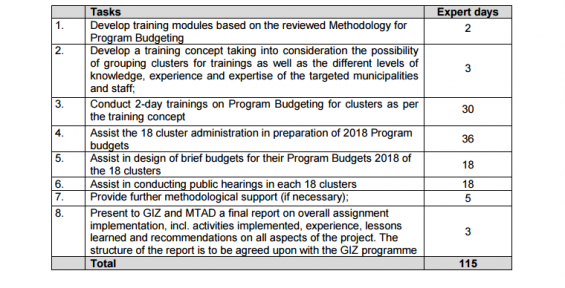The Good Local Governance Programme South Caucasus advises and supports respective partner organizations at national, regional (sub-national) and local levels in Armenia, Georgia and Azerbaijan in the implementation of cooperation initiatives towards improved local governance. It supports the improvement of frame conditions, addresses regional (subnational) governance issues and works towards the improvement of municipal services and citizens’ participation at municipal level. In the context of the German international cooperation approach, the Programme’s objectives are oriented within the framework of the Caucasus Initiative; thus the improved professional exchange among the countries of the South Caucasus and their increasing cooperation are also objectives at regional South Caucasus level.
In June 2016 the National Assembly has adopted Laws on establishment of 15 clusters with the elections appointed on September 8 and October 2.
The large-scale territorial and administrative reform in the country imposes systemic and structured approach to enhancing socio-economic development perspectives of the municipalities in the framework of national and sector strategies. Local capacities are in the core of the technical assistance provided to the LSGs by international and donor agencies with the objective to prepare municipalities to act effectively and efficiently in the new circumstances.
Current situation
In 2014 in ten municipalities of Armenia program budgeting (PB) approach was tested through trainings and consultancies. The experience gained during I phase PB trainings delivered in the first 10 pilot municipalities (Annex 2, Column C) were very productive and based on the findings, lessons learned, existing experience and gained knowledge the Program Budgeting Methodology for local level budgeting was developed. Outputs of the project’s I phase were 2015 program budgets for 10 municipalities.
In 2015-2016, additional 27 new municipalities and 3 newly established enlarged municipalities (Annex 2, Column D, F) were included in the project. Through ongoing consultancy and trainings Program Budgets for 27 municipalities (Annex 2, Column E) were designed using the PB Methodology, as well as the non-financial indicators database, which was developed to assist the municipalities in PB development processes. Brief Budgets also were developed and used during public hearings in pilot municipalities.
The target group of the proposed assignment includes representatives from current administrations, representative authorities, civic actions groups, non-government sector units and other stakeholders in the 18 new clusters: Dilijan, Tumanyan and Tatev, Urtsadzor, Amasia, Ashotsk, Arpi, Sarapat, Goris, Meghri, Gorayk, Tegh, Vayq, Jermuk, Zaritap, Noyemberyan Ayrum and Koghb, (Annex 2, Column F). Currently being the centre for clusters Noyemberyan, Zaritap, Vayq and Urtsadzor municipalities in 2015 before the enlargement have designed their 2016 program budgets as single municipalities. Additionally in 2016 Dilijan, Tumanyan, Tatev and Jermuk cluster municipalities have designed their 2017 Program Budgets. List of clusters and settlements is attached in Annex 1.
An important element to secure successful implementation of this assignment will be the continuous support of the MTAD, including both preparatory arrangements (agreements with the marzpetarans, mayors, community councils and other major stakeholders) and participation in the activities set out in the subsequent sections of this TOR.
Objectives, Deliverables and Methodology
Overall, the assignment aims to enhance capacities of the 18 partner enlarged municipalities to apply the Program Budget Methodology by topical trainings and consultancies to the administrative staff and council members.
The objectives of the assignment include but are not limited to:
1) Develop training modules based on the revised Methodology for Program Budgeting;
2) Develop a training concept taking into consideration the possibility of grouping clusters for trainings as well as the different levels of knowledge, experience and expertise of the targeted municipalities and staff;
3) Conduct 2-day trainings on Program Budgeting for clusters as per the training concept;
4) Assist the 18 cluster administration in preparation of 2018 Program budgets;
5) Assist in design of brief budgets for their Program Budgets 2018 of the 18 clusters,
6) Assist in conducting public hearings in each 18 clusters;
7) Provide further methodological support (if necessary);
8) Present to GIZ a final report on overall assignment implementation, incl. activities implemented, experience, lessons learned and recommendations on all aspects of the project. The structure of the report is to be agreed upon with the GIZ programme.
The deliverables expected on implementation of the Assignment will include:
a) Overall work plan for the implementation of the mission;
b) Concept on training of 18 cluster municipalities as per objective 2;
c) Report on training satisfaction feedback (provided by the GIZ programme) of participants incl. disaggregation by gender and cluster, as per objective 3;
d) 18 Draft Program Budgets before the public hearings;
e) 18 Brief Budgets for the public hearing;
f) 18 Public Hearings conducted;
g) 18 Final Program Budgets after the public hearing;
h) Final summary report as per objective 8.
Reporting
The experts will directly report to GIZ LoGoPro on the progress and completion of the tasks.
Level of efforts
The total level of efforts for this assignment is up to 115 expert days.
Schedule
The assignment is planned to commence in April 2017 and finish by end of February 2018. The exact commencement date and schedule of activities/work plan will be agreed at a later stage.
Selection Criteria
1) Demonstrated knowledge of financial management in local government system in Armenia;
2) Demonstrated experience of working in LSG sector;
3) Demonstrated knowledge and practical experience in methods of local planning, budgeting and M&E;
4) Demonstrated knowledge and experience of trainings in local financial management and accounting procedures;
5) Proven experience in cooperating with international and donor organisations in the country and the region.
6) Proven existence of experienced and knowledgeable staff to accomplish the tasks and assignments.

